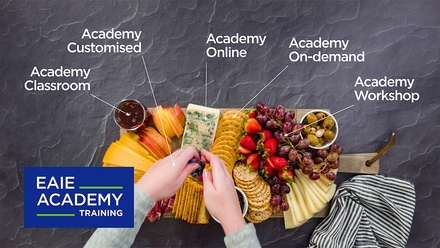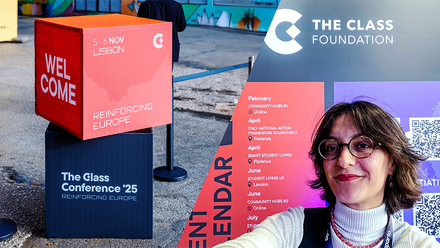Chess without a queen: beyond COVID-19

After the early displays of panic and hoarding, most of us are now getting used to the new reality of working from home, homeschooling, teleconferencing and a new-found sense of social solidarity. At the same time, the situation is becoming increasingly personal for members of the EAIE community and our sector at large, thus the kind of solidarity and support that this group provides will be more important than ever in the coming weeks and months.
Many of us are also wondering about the longer-term economic and social impacts of the global COVID-19 crisis. In the past ten or more years, well-known industry disrupters – like Massive Open Online Courses (MOOCs), Airbnb and Uber – have often been referenced in management books and in many conversations about strategy. Such strategy sessions at the EAIE have often raised the question of whether we had an eye towards and were prepared to cope with those types of disrupters; did we have the strength and innovative power to be a disrupter ourselves? The COVID-19 crisis already appears set to disrupt the global economy; the question now is to what extent it will be a disrupter of entire industries and societal order. Nobody knows yet.
EAIE at the crossroads
At the EAIE, we find ourselves at an important crossroads between two sectors that are affected greatly: international education and the events industry. They both depend heavily on face-to-face interaction and meeting, on experiences and travel. Both sectors have developed a huge impact on economies, are a way for people to develop and grow, and are envisioned to have a positive impact on society. Both have developed quality standards and best practices over the years. How are these sectors going to cope with the present crisis, what will they learn from it and will they be changed forever?
Although the EAIE does many different things and tries to support the sector and people working in it through various means, it’s primarily known for its Annual Conference and Exhibition. Being part of the EAIE has always implied the need to be aware of the developments in the international higher education field and at the same time keep abreast of the developments in the association sector and the events industry.
This is now more important than ever. And although there might be similarities between the two, an association is not a higher education institution, and vice versa, just as a medical association cannot be compared to a hospital or clinic. What associations in all their diversity try to do is share best practices, offer education and resources, and provide platforms to meet and exchange ideas.
The personal, face-to-face interaction is valued above all alternatives, in education as well as the meetings industry. The human animal is simply too social
With all the soft or hard lockdowns in place across the world, we see online sales skyrocketing and people having their groceries delivered. Many restaurants are trying to keep their business by transforming into take-out and delivery services. We have seen across the globe universities transforming their face-to-face teaching more or less overnight by implementing digital or virtual education. And indeed, as with so many businesses, we are seeing associations around the world researching and testing ways to deliver their services online.
Lessons from disruptions past
It’s only some 10 years ago that MOOCs were deemed to be the disrupter of traditional brick-and-mortar universities, and indeed higher education institutions all started developing or intensifying their distance learning efforts. In many cases this benefited universities, but it did not turn their business model upside-down, as some had expected at the time; personal, face-to-face teaching and learning remains valued above all. For that matter, there are also still many hotels around, despite Airbnb, and tons of taxis, despite Uber. Disruption doesn’t necessarily mean the death of a sector; what it does mean, however, is serving the needs of an audience that was not (fully) served by existing providers, often an audience of non-consumers. There lies the key to innovation, and those existing providers simply must try to adjust to the new reality.
The threat of being disrupted by MOOCs, and universities’ investment in distance education as a reaction, has probably contributed to their ability to react quickly to the COVID-19 crisis and move their programmes online, scaling up their existing potential from a few selected courses to all, fulfilling their social responsibility and saving their students form huge delays.
So what about associations?
Exactly 10 years ago, the eruption of the Icelandic volcano Eyjafjallajökull impacted air travel across Europe and the globe. I had just joined the EAIE and was confronted immediately with a potential crisis in relation to our Annual Conference in September, that year set to take place in Nantes. One association at that time changed their face-to-face conference into a virtual event, forced by a crisis, just to serve their community. Since then, many discussions have taken place around virtual and hybrid conferences, over time also as a way to serve the green agenda. No association would have a purely virtual annual meeting by design. The personal, face-to-face interaction is valued above all else, in education as well as in the meetings industry. The human animal is simply too social.
So what we see under pressure is, that higher education and the EAIE as an association have commonalities in their challenges and their pathways to solutions.
COVID-19: the long view
Although it is too early to tell, there seems to be no doubt that this pandemic will push our economies into a recession or depression; some sectors might thrive while others will be hard-pressed just to survive. In society we are now seeing how much people depend on government and their leadership, often seen as a burden until recently, and how all of a sudden, underappreciated roles are being revalued, from doctors and nurses to cleaners. Whether those changes will hold steady after the dust has settled, is an open question. Whether the feeling of solidarity and of being ‘in this together’ will win over individualism and selfishness in the long run remains to be seen; so far, there are mixed signals.
But it’s fair to say that the present crisis will turn out to be a disrupter of sectors and industries; we just don’t know yet how. How will that play out for international higher education, so dependent on physical mobility? We might see more interest and investments in Internationalisation at Home, intercultural learning and Collaborative Online International Learning (COIL) – but it could also be that in a year from now we have returned to business as usual. The disruptive power of this crisis might be limited to a few important, but marginal innovations.
The same might happen with associations: innovations, yes, but probably not a completely different business model. For most, the annual meeting is their bread and butter; it’s what they are all about, the way classrooms are core to universities.
Playing with all the pieces
I came across this very helpful metaphor in relation to the COVID-19 crisis:
"If you want to learn how to play chess, you should start by removing your own queen. Once you’ve mastered the game without the most powerful piece, then put the queen back in and see how good you are!"
Now that the queen has been taken off the board it’s time to rediscover what all the other pieces can do.
So the EAIE is now looking at its other ‘pieces’ and is planning to intensify webinars and webcasts, to develop virtual town hall meetings, and to open up the timely Spring 2020 issue of its member magazine Forum on Digitalisation to the wider non-member audience. And if the queen is still not back on the board by October, then we will try to harness the richness of our conference programme in another way. In these times of crisis, the EAIE Board and wider leadership are bringing creativity and collaboration to all these initiatives.
The EAIE has come a long way in the past decade, and I am confident that the present circumstances will propel our efforts to exchange ideas and best practices and to form a tight-knit community. So, in absence of the queen, we will play with what we have left and what we can take on board now, and I am confident we will come out stronger.






